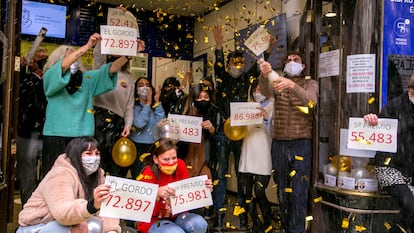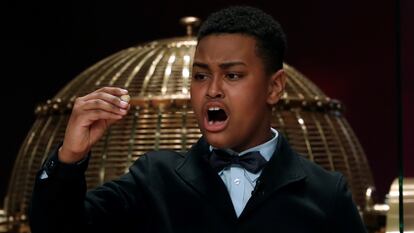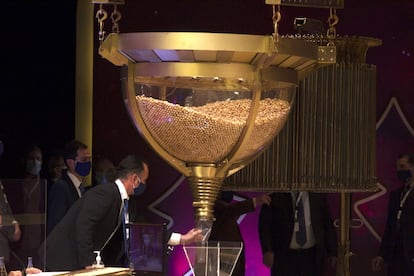Winners across Spain celebrate results of ‘El Gordo’ Christmas lottery
The top prize in the world-famous draw was called for the number 72897 a little after noon

The winning number in this year’s Christmas lottery – popularly known as El Gordo (The Fat One) – is 72897. The lucky five-digit figure corresponding to the top €4-million prize was sung out by two children from San Ildefonso school as per tradition shortly after noon.
The number was sold at lottery sales points in the following locations: Punta Humbría (Huelva), Reus (Tarragona), Granada, Madrid, Boñar (León), O Grove (Pontevedra), Bilbao, Granadilla de Abona (Santa Cruz de Tenerife), Javea (Alicante), Cáceres, El Puerto de Santamaría (Cádiz), Córdoba, Haría (Las Palmas), San Pedro del Pinatar (Murcia), Vigo, O Porriño (Pontevedra), Salamanca, Bonavista (Tarragona), Oliva (Valencia), Alfara del Patriarca (Valencia) and Zamora.
Manuel Rodríguez, a lottery seller in O Grove (Pontevedra) who sold a series of the top prize, was in tears as he described it as “an enormous reward on a very difficult year” when establishments like his were shut down due to coronavirus restrictions. “I’m going to bring some centollos [a spiny crab popular in Galician gastronomy], the kings of seafood, to celebrate,” he said.

A little after 11am, the third prize had been called out: 52472. The second prize was called just over an hour later: 06095.
The world-famous lottery is handing out over €2.4 billion in prizes, €28 million more than last year.
Madrid’s Teatro Real opened its doors on Tuesday at around 7.15am to allow members of the press and the children to enter. But for the first in its history, the Christmas tradition took place without an audience due to coronavirus safety measures.
In another change from previous years, prizes under €40,000 will not be taxed. Until now, authorities were taking 20% of all amounts above €20,000, but the threshold has been raised this year in a move that will deprive the Tax Agency of around €18.6 million compared with last year, according to an estimate by the tax workers union Gestha.
The coronavirus pandemic also affected lottery sales, which fell for the first time in six years, according to Jesús Huerta, the president of the state gambling agency Selae. This year, a total of €2.58 billion in tickets was sold, an 11% fall from last year’s figure.
In Spain’s Christmas lottery, every number is divided into 10 identical segments, or décimos, costing €20 each. Because numbers are also divided into series, there are in fact 1,600 tickets with the same number sold at lottery sales points across the country, making it impossible for one person to buy them all.
Many people buy even smaller stakes in several décimos to increase their chances of winning something. A €1 stake in the winning number is worth €20,000, while a €20 décimo pays out €400,000 before taxes.
But those who miss out on El Gordo can still win significant amounts. Second prize awards €125,000 to each winning décimo or €6,250 for every euro played. Third prize is €50,000 for a décimo or €2,500 for every euro. The Christmas lottery also includes 1,794 prizes of €1,000 for every décimo or €5 for every euro (the so-called Pedrea). Punters also have the chance to win back the cost of a décimo (the Reintegro) if the last digit of their number matches the last digit in the six-digit sequence that wins first, second or third prize.
All prizes of over €2,500 are subject to a 20% tax which means holders of a décimo will take home €320,050 with the rest going to the tax office.
Long tradition

Spain’s first national Christmas lottery took place on December 18, 1812. But historians say it was first conceived to buy bullets and make cannons to fight the French troops attacking the Andalusian city of Cádiz, which in 1812 was Spain´s last line of defense against the Napoleonic invasion.
Although the lottery was created during the siege of Cádiz, by the time the lottery was celebrated the siege had already ended, having lasted from February 5, 1810 to August 25, 1812.
The war, however, was still raging, and the lottery spread from Andalusia to the rest of Spain as the Spanish troops defeated the French. In 1814, when the war was nearly over, the lottery headquarters moved from Cádiz to Madrid, and it has remained in the capital ever since.
CHRISTMAS LOTTERY PRIZES (FOR EACH OF THE 170 SERIES)
Tu suscripción se está usando en otro dispositivo
¿Quieres añadir otro usuario a tu suscripción?
Si continúas leyendo en este dispositivo, no se podrá leer en el otro.
FlechaTu suscripción se está usando en otro dispositivo y solo puedes acceder a EL PAÍS desde un dispositivo a la vez.
Si quieres compartir tu cuenta, cambia tu suscripción a la modalidad Premium, así podrás añadir otro usuario. Cada uno accederá con su propia cuenta de email, lo que os permitirá personalizar vuestra experiencia en EL PAÍS.
¿Tienes una suscripción de empresa? Accede aquí para contratar más cuentas.
En el caso de no saber quién está usando tu cuenta, te recomendamos cambiar tu contraseña aquí.
Si decides continuar compartiendo tu cuenta, este mensaje se mostrará en tu dispositivo y en el de la otra persona que está usando tu cuenta de forma indefinida, afectando a tu experiencia de lectura. Puedes consultar aquí los términos y condiciones de la suscripción digital.








































